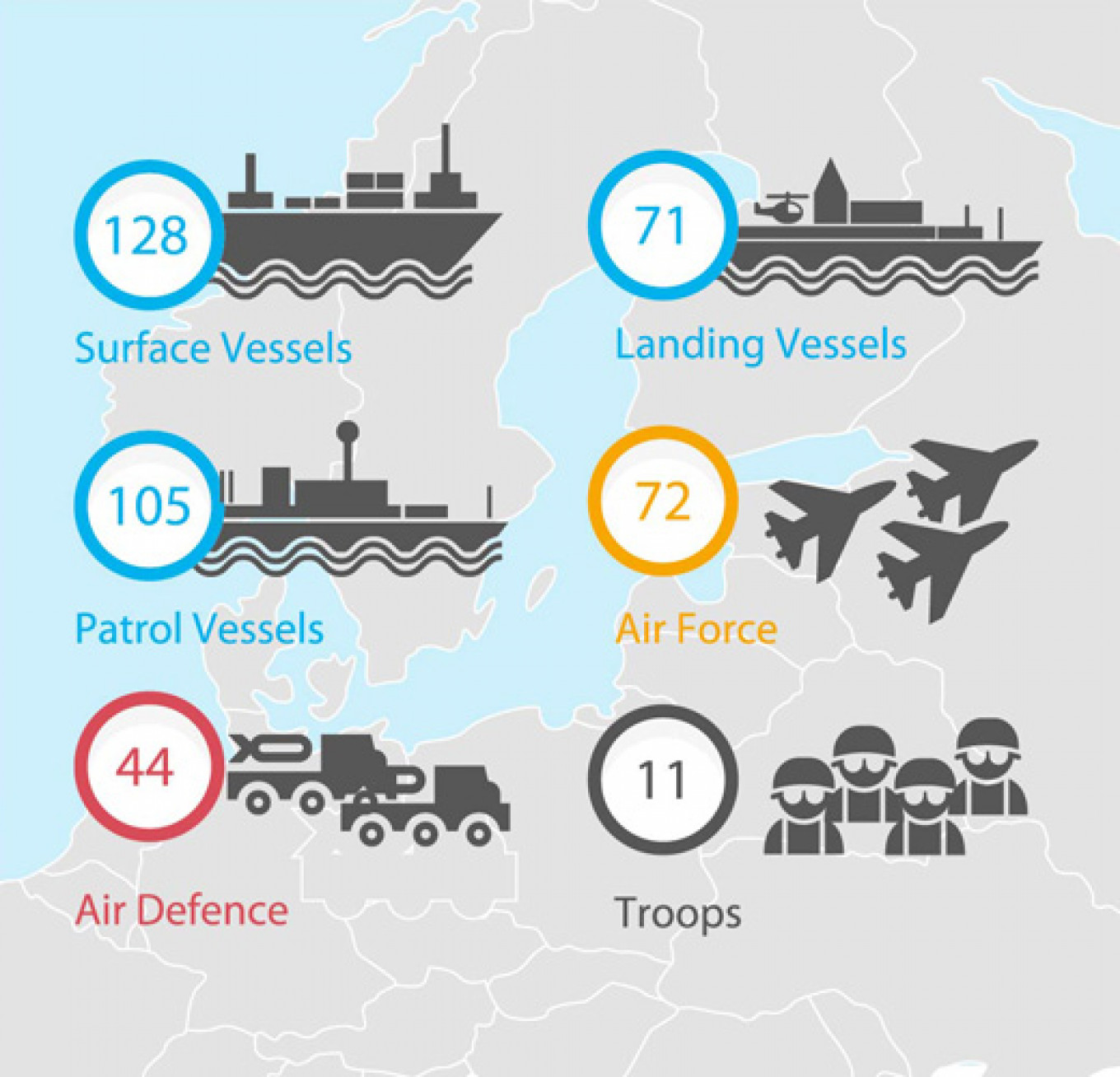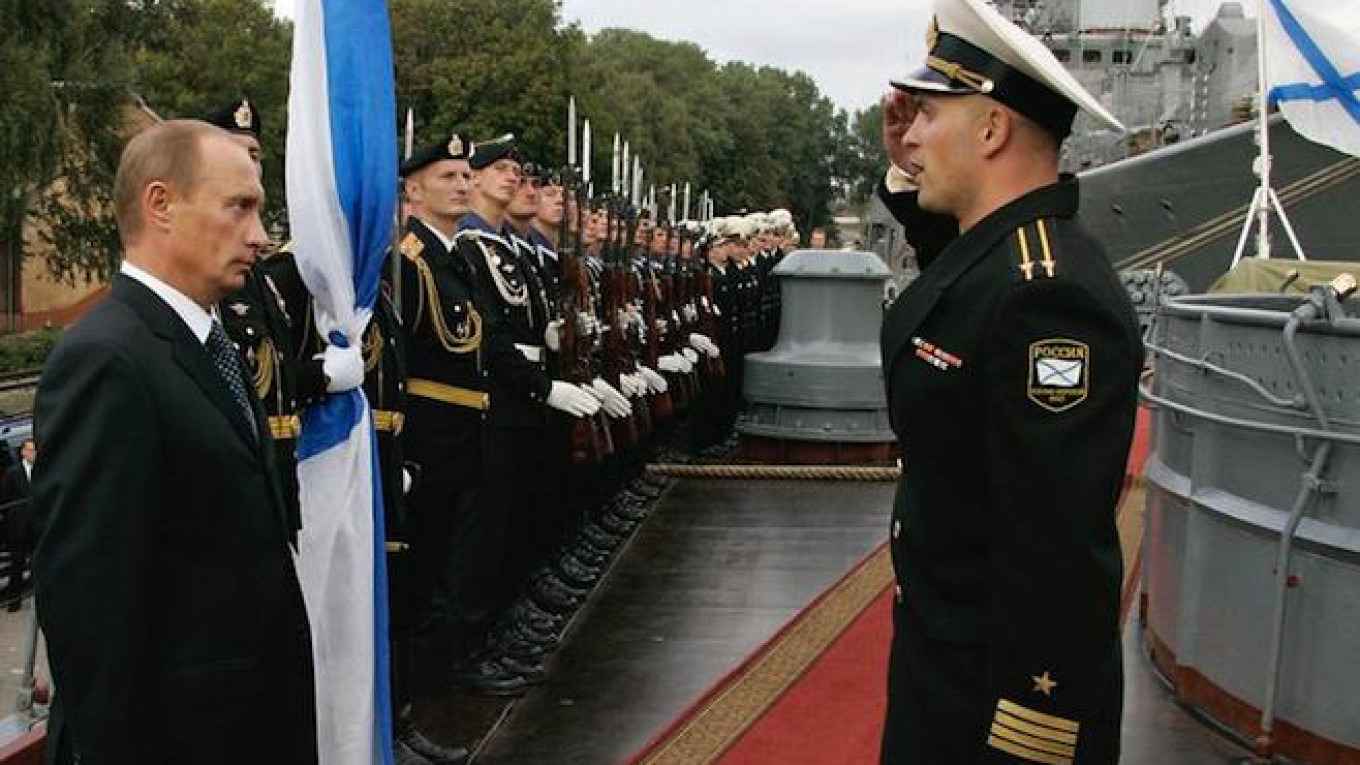On July 26, 2015, on the annual Navy Day holiday,
President Vladimir Putin traveled to Russia’s western outpost of
Kaliningrad to pay tribute to the country’s resurgent armada.
“The courage of our sailors, the talent of our shipbuilders, and the spirit of our famous pioneers, explorers and naval commanders have confirmed Russia's status as a great sea power,” the president declared. Putin reserved special praise for the Baltic Fleet, which was “carrying the flag with honor in the Baltic … and in other parts of the world too.”
The confident rhetoric rang loudly in Western capitals, where scores of experts and officials agreed with his assessment of Russia's modernized military. U.S. admirals now point to Russian submarines and defense arrangements as the leading threat to U.S. ships in European waters, and the Baltic Fleet is a focal point of those concerns.
But behind Putin's triumphant words, all was not as it seems with the Baltic Fleet.
On June 29, the Russian Defense Ministry announced it was purging the entire senior and mid-level command of the Baltic Fleet. It was a dramatic move that suggested deep structural problems within the fleet command. In total, 50 officers were dismissed from their post, including the fleet commander, Vice Admiral Viktor Kravchuk, and his chief of staff, Vice Admiral Sergei Popov.
Not since Stalin's purges had so many officers been ousted at once.
If the decision to remove the entire command staff was unprecedented in the Russian military tradition, the manner in which the Defense Ministry publicly accused the officers of dereliction of duty was even more surprising. Usually, a disgraced officer will be quietly shown the door, and a press release will chalk it all up to health troubles. But they made an example of Kravchuk.
On June 29, the Defense Ministry issued a statement that pulled no punches. Kravchuk and his command had, it said, showed “serious shortcomings in the organization of combat training, daily activities of their forces, failure to take all necessary measures to improve personnel accommodations, inattention to their subordinates and distorted reports on the real state of affairs [in the fleet].”
Russia's military watchers were caught off guard by the announcement, but have since offered several explanations for the heavy-handed treatment of Kravchuk and his staff.
“This is undoubtedly connected to the departure of Admiral Viktor Chirkov, the head of the navy, last year” says Mikhail Barabanov, editor-in-chief of Moscow Defense Brief, an analytical monthly published by the Center for the Analysis of Strategies and Technologies (CAST). Chirkov left his post in November 2015, with reports citing health concerns.
“Kravchuk was considered to be one of Chirkov’s guys,” says Barabanov. Both shared a history at the Baltic Fleet; for some time Kravchuk was Chirkvov's deputy commander. When Chirkov was promoted to Moscow, Kravchuk took the helm. With Chirkov's departure from the navy, “Kravchuk lost his patron.”
Others, however, point to evidence of incompetence and corruption in what is seen by the Kremlin as an increasingly important strategic force in the face of heightened tensions with the NATO alliance since 2014.
The decision to fire the entire command came at
the end of a month-long Defense Ministry inspection, which concluded
on June 10. According to St. Petersburg news outlet Fontanka.ru,
the inquiry had been sparked by an unconfirmed collision of the
submarine Krasnodar with another vessel — possibly a Polish patrol
boat — during a training exercise. The Baltic command attempted to
cover up the incident, Fontanka.ru
reported.
According to Barabanov, the Baltic Fleet remains a secondary naval force. While it has received several new vessels, modernization efforts have little to do with the command staff. The Defense Ministry had a more ambitious vision for the Black Sea Fleet — that it become the central command authority for a “Fortress Kaliningrad” unified structure comprised of all Russian forces in the region.

The Fortress Kaliningrad structure is one of NATO’s biggest nightmares in the region; Western commanders, already uneasy by their apparent geographic disadvantage in the Baltic region, have been sounding the alarm over the past two years. Kravchuk's task was to unify local air force units, coastal defense batteries, and even Iskander missile systems (when in theater) under the Baltic Fleet command. Defense Minister Sergei Shoigu's heavy-handed crackdown on Kravchuk suggests he failed to adequately do this, and the Baltic Fleet is unprepared for a potential war.
This is a very different mission for the Baltic Fleet than its traditional post-Soviet role as a training fleet. “Kravchuk may have failed to adapt to the new reality quickly enough,” says Dmitry Gorenburg, a Russian navy expert at the Virginia-based CNA think tank. “But I am beginning to think corruption was really the key.”
According to Fontanka.ru, corruption indeed factored heavily into Shoigu's decision to liquidate the fleet command structure. Kravchuk reportedly had a relationship with a local organized crime boss, Viktor Bogdan, who was stealing diesel fuel from the fleet. Furthermore, part of the Fortress Kaliningrad project required housing to be constructed for the 11th Army Corps, stationed at the Baltiysk Naval Base. Funds for the barracks reportedly disappeared, and the soldiers were left to live in squalor, Fontanka.ru reported.
“The Russian leadership is clearly fine with corruption, but I think this was meant to signal others in the military and the security services that you can go ahead and steal and do what you want to do, but if you do that to an extent that combat readiness suffers, there will be consequences,” Gorenburg says.
Shoigu has already appointed new commanders to the Baltic Fleet, Russian media outlets reported on July 1. The new commander will be Vice Admiral Alexander Nosatov from the Black Sea Fleet. His chief of staff will be Vice Admiral Igor Mukhametshin, a former commander of the Pacific Fleet's strategic nuclear submarine forces.
It is unlikely the Baltic Fleet will languish for long. According to reports, Nosatov has been given the rest of the year to turn the fleet around, and make it worthy of Putin's high praises on Navy Day, 2017.
A Message from The Moscow Times:
Dear readers,
We are facing unprecedented challenges. Russia's Prosecutor General's Office has designated The Moscow Times as an "undesirable" organization, criminalizing our work and putting our staff at risk of prosecution. This follows our earlier unjust labeling as a "foreign agent."
These actions are direct attempts to silence independent journalism in Russia. The authorities claim our work "discredits the decisions of the Russian leadership." We see things differently: we strive to provide accurate, unbiased reporting on Russia.
We, the journalists of The Moscow Times, refuse to be silenced. But to continue our work, we need your help.
Your support, no matter how small, makes a world of difference. If you can, please support us monthly starting from just $2. It's quick to set up, and every contribution makes a significant impact.
By supporting The Moscow Times, you're defending open, independent journalism in the face of repression. Thank you for standing with us.
Remind me later.






